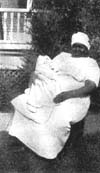Negro Folk Songs and Spirituals Part 2
 By James Weldon Johnson Click here for part 1 of this article
By James Weldon Johnson Click here for part 1 of this article
(left, "Ma" White) How, it may be asked, were the Spirituals composed ? Were they the spontaneous outburst of a group, or the work of talented song makers ? In those days there was a definitly recognized order of bards, and to some degrees it still exists. These bards gained their recognition by achievement. They were makers of songs and leaders of singing. They had to possess talents: a gift of melody, a strong voice, a good memory and a talent for poetry. There was, at least, one leader of singing in every congregation, but makers of the songs were less common.My memory of childhood goes back to a great leader of singing, "Ma" White, and a maker of songs, "Singing" Johnson. "Ma" White was an excellent laundress and a busy woman, but each church meeting found her in her place ready to leade the singing. And, even as a child, my joy in hearing her sing the Spirituals was deep and full. One of her duties was to "sing down" a longwinded or uninteresting speaker, and even to cut short a prayer of undue length by raising a song - a gentle method of gaining relief for the congregation. "Singing" Johnson`s only business was singing. He was not only a fixture in any congregation or country, but went about from one place to another singing his way. He composed songs and his congregation followed and joined with him and frequently answered his singing with antiphonal responses. "Singing" Johnson was a great judge of the appropriate song to sing for any service and could come to the preacher`s support with a line or two of song, after a climax in the sermon. A study of the Spirituals leads to the belief that the earlier ones were built upon the form so common to African songs - leading lines and response. It would be safe, I think, to say that the bulk of the Spirituals are cast in this simple form. Among those following this simple structure, however, are some of the most beautiful slave songs. One of these, whose beauty is unsurpassed is "Swing Low, Sweet Chariot." But as the American Negro went a step beyond his original African music in the development of melody and harmony, he also went a step beyond in the development of form. The lead and the respose are still retained, but the response is developed into a true chorus. In a number of songs there are leads, a response and chorus. In this class of songs the chorus becomes the most important part, dominating the whole song and coming first. Such a song is the well-known "Steal Away to Jesus." In this song the congregation begins with the chorus, singing it in part harmony. This developed form is carried a degree farther in "Go Down Moses." Here the congregation opens with the powerful theme of the chorus, singing it in unison down to the last line, which is harmonized.(left, Paul Robeson) In a few of the songs this development is carried to a point where the form becomes purely choral. Examples of these are "Deep River" and "Walk Together Children." Carl Van Vechten has declared it as his opinion that white singers cannot sing Spirituals. His statement, i take it, has specific reference to the singing of these songs as solos on the concert stage. I agree that white singers are, naturally, prone to go to either of two extremes: to attempt to render a Spiritual as though it were a Brahms song, or to assume a "Negro Unctuousness" that is obviously false, and painfully so. I think white singers, concert singers, can sing Spirituals - if they feel them. Singers who take the Spirituals as mere "art" songs, and singers who make of them an exhibition of what is merely amusing, are doomed to failure, as far as the interpretation is concerned. This is true not only of white singers, but Negro singers as well. The truth is, these songs, primarily created and constructed, as they were, for group singing, will always remain a high test for the individual artist. They are not concert material for the mediocre soloist. Through the genius and supreme artistry of Roland Hayes these songs undergo, we may say, a transfiguration. He takes them high above the earth and sheds over them shimmering silver moonlight and flashes of the sun`s gold; and we are transported as he sings. By a seemingly opposite method, through sheer simplicity, without any conscious attempt at artistic effort and devoted adherence to the primative traditions, Paul Robeson achieves substantially the same effect. These two singers, apparently so different, have the chief essential in common: they both feel the Spirituals deeply. Mr. Hayes not with standing all his artistry, sings these songs with tears on his cheeks. It is not, however, as solo singing that we should think of Spirituals, it is rather as communal music, singing in harmony. The harmonization of the Spirituals by the folk group in singing them is what distinguishes them among the folk songs around the world. It is only natural that Spirituals should be sung in harmony, for the Negro`s musical soul expresses itself instinctively in the communal spirit and in rich and varied harmonies. Of the words of the Spirituals not so much, of course, can be said as of the music. Both the negro bard and his fellow singers worked under mental limitations that handicapped them. Many of the lines of the Spirituals are trite, and there is monotonous repitition. But there is an appealing simplicity - and in some of the Spirituals, real poetry, the naive poetry of a primative race. Article taken from The Mentor, February 1929.


